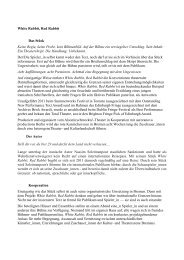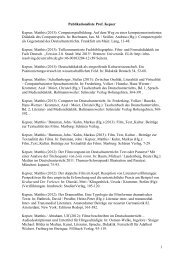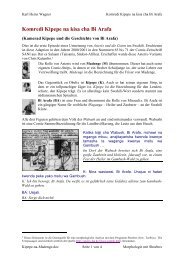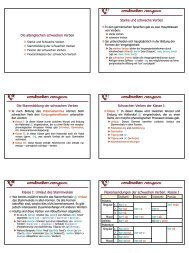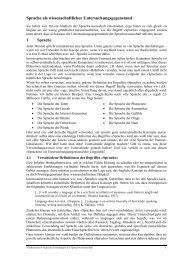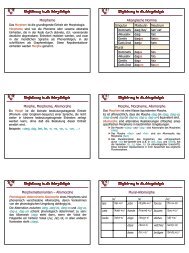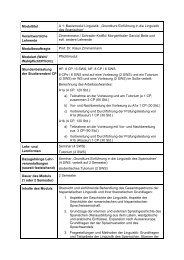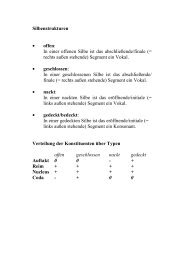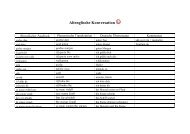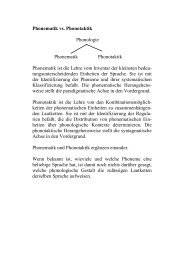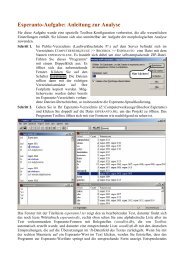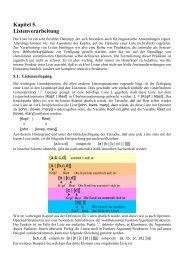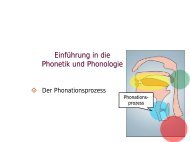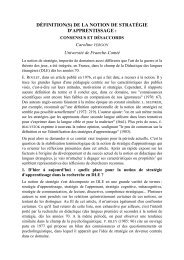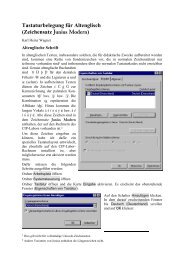Relativism and Universalism in Linguistics - Fachbereich 10 ...
Relativism and Universalism in Linguistics - Fachbereich 10 ...
Relativism and Universalism in Linguistics - Fachbereich 10 ...
You also want an ePaper? Increase the reach of your titles
YUMPU automatically turns print PDFs into web optimized ePapers that Google loves.
76 Sections<br />
Modal Particles <strong>in</strong> Dutch <strong>and</strong> Afrikaans:<br />
a Case of Divergence<br />
Conradie, Jac<br />
University of Johannesburg, South Africa<br />
jacc@uj.ac.za<br />
Modern Dutch <strong>and</strong> Afrikaans, two closely related languages (Afrikaans deriv<strong>in</strong>g form 17 th<br />
cent. Dutch), have both shown a propensity for develop<strong>in</strong>g modal particles. In as far as the<br />
presence of a syntactic middle field may be a factor <strong>in</strong> the creation of such particles (cf. W.<br />
Abraham), Dutch <strong>and</strong> Afrikaans may both partake of a universal tendency. While the two<br />
languages still have a considerable number of particles <strong>in</strong> common, deriv<strong>in</strong>g from earlier<br />
language phases, each has after their separation gone on to develop its own set of modal<br />
particles, such as best, echt, soms, eens, even <strong>in</strong> the case of Dutch, <strong>and</strong> hoeka, mos, sommer,<br />
glo, rêrig, darem <strong>in</strong> the case of Afrikaans. A number of <strong>in</strong>herited Dutch temporal adverbs<br />
have developed a modal value <strong>in</strong> Afrikaans.<br />
It seems likely that these later developments <strong>in</strong> both languages differ both as to the source of<br />
the modals <strong>and</strong> their target profiles, which would <strong>in</strong>dicate a certa<strong>in</strong> relativism <strong>in</strong> the<br />
development of modals. Thus a factor which seems to have given rise to Dutch modal such as<br />
best <strong>and</strong> echt seems to be metonimia, while the new Afrikaans modals often derive from<br />
temporal expressions, such as the Khoi loan hoeka <strong>and</strong> Dutch derived temporal adverbs which<br />
have taken on a modal sense <strong>in</strong> Afrikaans, for example straks, reeds, dalk (< dadelijk), aans<br />
(< aanstonds), altemit, netnou. Soms, mean<strong>in</strong>g ‘from time to time’ <strong>in</strong> both languages, is<br />
exceptional <strong>in</strong> that it only became modal <strong>in</strong> Dutch. As far as semantic or pragmatic values are<br />
concerned, Dutch seems to target politeness (eens, even, soms) <strong>and</strong> persuasion (heus, echt)<br />
while Afrikaans targets probability (dalk), make-believe (kamma) or hearsay (glo), the<br />
assertion or validation of the speaker’s po<strong>in</strong>t of view (rêrig, darem), <strong>and</strong> solidarity between<br />
speaker <strong>and</strong> addressee (mos).<br />
Aspectual coercion <strong>in</strong> Bulgarian negative imperatives<br />
Kühnast, Milena<br />
Zentrum für Allgeme<strong>in</strong>e Sprachwissenschaft (ZAS), Berl<strong>in</strong><br />
kuehnast@zas.gwz-berl<strong>in</strong>.de<br />
Bulgarian is known as a language which has a negative imperative construction with a<br />
genu<strong>in</strong>e verbal imperative <strong>in</strong>flection. From a Slavic perspective this would be a trivial<br />
statement, if Bulgarian was not the only Slavic language exhibit<strong>in</strong>g aspectual coercion <strong>in</strong><br />
negative imperatives. Negative Imperatives with perfective verbs are ungrammatical.<br />
Imperfective or secondary imperfectivised verbs are obligatory <strong>in</strong> Preventives <strong>in</strong> which other<br />
Slavic languages regularly choose perfective verbs.<br />
In the follow<strong>in</strong>g I want to argue that this phenomenon is due to the <strong>in</strong>ability of Bulgarian<br />
perfective verbs to express f<strong>in</strong>iteness. The reason<strong>in</strong>g follows the cognitive approach of time<br />
categorisation <strong>in</strong> language (Kle<strong>in</strong>, 1994) <strong>and</strong> provides typological evidence contrast<strong>in</strong>g the<br />
different functions of perfective verbs <strong>in</strong> Bulgarian <strong>and</strong> other Slavic languages.<br />
F<strong>in</strong>iteness is synonymous with tense expression, signall<strong>in</strong>g that a speaker makes an assertion<br />
restricted to a time span which is located with respect to the time of speak<strong>in</strong>g. This<br />
comb<strong>in</strong>ation of truth assertion <strong>and</strong> a time stretch, called Topic time (TT), is also essential for<br />
the def<strong>in</strong>ition of aspect. Depend<strong>in</strong>g on the relations between TT <strong>and</strong> the duration of a<br />
situation, different aspectual values are yielded. Perfectivity means a full or partial <strong>in</strong>clusion



